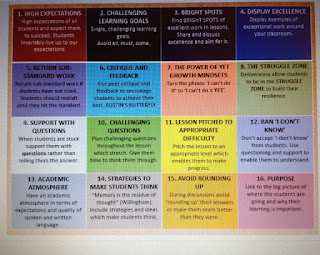With a focus on differentiation, it seemed apt to find a blog post on Challenge. I like #15 here - 'Don't Round Up'. When students answer questions in class do we too often focus on the parts that are right and move on? I often tell them in what ways they are right but then ask them to improve their answer, or challenge others in the room to improve their answers.
The word challenge is much used in education. There can be no doubt that sufficient challenge is important and the stakes are high. Too challenging and students give up and find learning uninspiring. Too little and work becomes too easy and monotonous and little learning happens.
Here are 16 strategies that may help you to challenge students.
Much of these strategies are self explanatory or maybe even plain obvious. However, I think these three ideas in particular are all really important.
Firstly, as Willingham rightly says
‘Memory is the residue of thought’. So, strategies that make students think are essential, in my view, for challenging learning. Otherwise, we run the risk of our students being on ‘autopilot’ and therefore not learning.
Secondly, encouraging students to take risks in their learning and not worrying about failure. This is easier said than done. However, a climate of excellence, positive classroom relationships and using the ideas of Dweck’s Growth Mindsets should support this.
Thirdly, I had increasingly come to believe that questioning is one of the most essential tools in the pedagogical toolbox. Doug Lemov’s ideas in his work ‘Teach like a Champion’ really struck a chord with me. Not rounding up student answers and using probing questioning to challenge misconceptions and promote deeper thinking can be adeptly utilised by the teacher to support challenge, thinking and understanding. Crucial is not just the questions we ask but how we respond to their responses. Through increasing our own wait time by a few seconds we can ask more probing questions and foster better class discussions.
Clearly, this is not an exhaustive list. Ultimately, it’s about us, as teachers, taking that risk and really believing our students can do it. So, what if the students say ‘I can’t do it’. Great! They are being challenged. ‘You can’t do it yet’ must be our reply.
So, think about how we learnt to ride a bike when we were younger. When it happens and clicks it really is one of those ‘eureka’ moments. Yet it happens through challenge. Taking the stabilisers off, experiencing the failure and frustration of falling off and taking the risk to really really go for it. That’s what makes lessons challenging too!
What are your ideas on how to best challenge students?




















